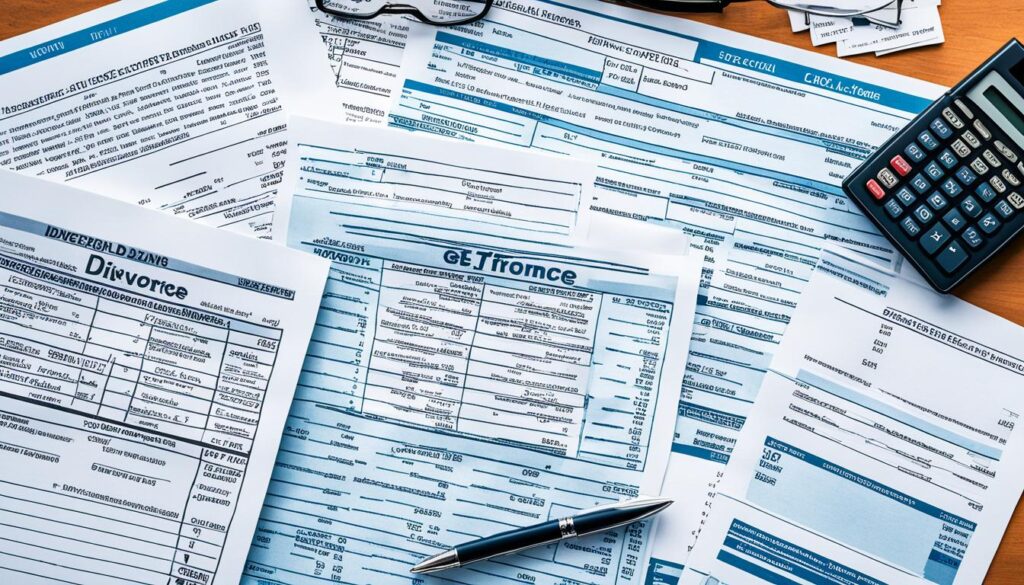Did you know that in divorces where financial disputes arise, approximately 60% of spouses suspect their partners of hiding assets? These covert actions can significantly impact the equitable distribution of assets and the financial well-being of both parties. This underscores the significance of financial disclosure during divorce proceedings.
Financial discovery is the process of gathering comprehensive financial information to ensure transparency and facilitate fair negotiations during a divorce. It involves exchanging financial documents, completing forms, and potentially working with professionals such as forensic accountants to shed light on hidden assets and income. By undertaking financial discovery, both parties gain a deeper understanding of each other’s financial situations, paving the way for a more equitable resolution.
Key Takeaways:
- Financial discovery in divorce is essential for ensuring transparency and fair asset division.
- Nearly 60% of spouses suspect their partners of hiding assets in divorces involving financial disputes.
- The process involves exchanging financial documents, completing forms, and potentially working with professionals.
- Financial discovery empowers both parties with a deeper understanding of each other’s financial situations.
- By proactively participating in financial discovery, spouses can navigate the divorce process more effectively.
What is Financial Discovery in Divorce?
Financial discovery in divorce is a crucial component of the discovery phase in a divorce case. It involves the collection and exchange of financial information between both parties to gain a comprehensive understanding of their assets, liabilities, income, and debts. The purpose of financial discovery is two-fold: to promote transparency and to prepare for negotiations related to support payments, child custody arrangements, and the division of marital and personal property.
During the financial discovery process, both spouses can request and provide relevant financial documents and testimonies. This exchange of information allows each party to have a clear picture of the other’s financial situation and ensures equitable decision-making throughout the divorce proceedings.
The importance of financial discovery cannot be overstated when it comes to protecting the rights and interests of both parties involved. By obtaining a complete understanding of the financial aspects of the marriage, individuals can make informed decisions and negotiate from a position of knowledge. This process ultimately contributes to the establishment of a fair settlement that takes into account the financial realities of both parties.

Is Financial Discovery Always Necessary in Divorce?
While financial discovery is a common part of the divorce process, it is not always necessary. If both spouses agree on all terms of the divorce, they may choose to skip the financial discovery phase. However, financial discovery becomes necessary when there are disputes over asset division or when one spouse suspects the other of hiding assets or income.
Financial discovery serves a crucial role in understanding each party’s financial situation to ensure a fair and equitable settlement. It provides transparency and allows both parties to have a complete picture of the assets, liabilities, income, and debts involved in the divorce.
By uncovering all financial information through the discovery process, the court can make informed decisions regarding support payments, child custody arrangements, and the division of marital and personal property. It helps prevent one party from taking advantage of the other and ensures a fair resolution.
Having accurate financial information is vital in making sound and informed decisions during divorce proceedings. It allows both parties to assess their financial standing and negotiate from a position of knowledge and understanding.
Financial discovery is like shedding light on the hidden corners of a divorce, ensuring that each party has a fair chance at a fresh start.
By going through the financial discovery process, individuals can gather the necessary evidence to substantiate their claims or rebut the other party’s arguments. It provides an opportunity to uncover any hidden assets, income, or debts that might have otherwise gone unnoticed.
Moreover, financial discovery can uncover financial discrepancies, leading to fairer outcomes and preventing one party from being taken advantage of.
However, it’s important to note that financial discovery can also add additional time and costs to the divorce process. Gathering all the necessary financial documents, completing forms, and potentially working with professionals can prolong the proceedings and increase legal expenses.
Ultimately, whether financial discovery is necessary in a divorce depends on the unique circumstances of the case. If there are significant financial complexities or disagreements between the parties, financial discovery becomes essential to ensure a fair resolution.
Alternatives to Financial Discovery
While financial discovery is a standard procedure, alternatives such as mediation can help avoid the need for extensive financial discovery.
Mediation provides an opportunity for both parties to work collaboratively and confidentially with a neutral mediator. It can be a more cost-effective and amicable approach to divorce, especially when both parties are willing to cooperate and find mutually beneficial solutions.
Through mediation, couples can negotiate and reach agreements without the need for extensive financial discovery. It allows them to focus on creating a personalized settlement that meets their specific needs and goals.
Moreover, online divorce platforms like Hello Divorce offer non-lawyer assistance and mediation services to simplify the process and potentially avoid the need for extensive financial discovery. These platforms provide resources, support, and guidance to help individuals navigate the divorce process effectively.
With the right approach and support, couples can find alternatives to financial discovery that streamline the process, minimize conflict, and lead to a more peaceful and satisfactory resolution.
| Financial Discovery | Alternatives | |
|---|---|---|
| Process | Involves exchanging financial documents, completing forms, and potentially working with professionals. | Utilizes mediation and online divorce platforms for collaborative negotiations. |
| Cost | May increase legal expenses due to additional time and professional involvement. | Can be more cost-effective compared to prolonged financial discovery procedures. |
| Timeline | Can extend the divorce process, adding weeks or months to reach a resolution. | Offers the potential for a faster resolution through collaborative negotiations. |
| Outcome | Provides comprehensive financial information for a fair settlement. | Allows for personalized agreements tailored to the specific needs of the couple. |
While financial discovery remains a crucial tool in the divorce process, individuals should consider their unique circumstances and explore alternatives that may offer a more efficient and amicable resolution.
The Financial Discovery Process
The financial discovery process in divorce is a crucial step in obtaining a comprehensive understanding of the parties’ financial situation. It involves the exchange of financial documents and the use of interrogatories to gather relevant information.
During the financial discovery process, both spouses are required to provide essential financial documents such as:
- Bank statements
- Tax returns
- Pay stubs
- Credit card statements
- Investment account statements
These documents play a vital role in assessing the assets, liabilities, and income of each party.
In addition to the exchange of documents, the use of interrogatories allows parties to ask written questions to gather further information. Interrogatories can be used to delve into specific details about assets, liabilities, and income, ensuring a comprehensive understanding of the financial picture.
How the Process Works
The financial discovery process usually begins with each party disclosing their financial documents to the other party. This can be done through their attorneys or directly between the spouses, depending on the circumstances of the case.
Once the initial disclosure is complete, each party has the opportunity to review the provided information and may have follow-up questions. This is where the use of interrogatories comes into play. Written questions can be submitted to the other party to seek clarification or request additional information.
Throughout the discovery process, it is essential for both parties to respond in a timely and thorough manner. Cooperation and transparency are key in facilitating a fair and equitable settlement.
The Benefits of the Financial Discovery Process
The financial discovery process serves several important purposes:
- Facilitating transparency: By exchanging financial documents and answering interrogatories, both parties gain a comprehensive understanding of each other’s financial situation.
- Promoting fair negotiations: The information gathered during the financial discovery process forms the basis for negotiations and helps ensure an equitable division of assets, liabilities, and income.
- Preventing hidden assets: The financial discovery process helps uncover any attempts to hide or withhold assets, ensuring that all relevant information is considered during the divorce proceedings.
The financial discovery process may take time as both parties gather and exchange the necessary information. However, it is a crucial step in safeguarding the rights and interests of both spouses, ultimately leading to a fair and just resolution.

How Long Does Financial Discovery Take?
The duration of the financial discovery process in divorce can vary depending on the complexity of the case and the willingness of each party to provide complete responses. It can take weeks or even months to gather and exchange all the necessary financial information. Factors such as the availability of records and the cooperation between spouses can impact the timeline.
During the financial discovery process, both parties are required to actively participate and provide the requested information in a timely manner to avoid any delays in the divorce process. The more efficiently and promptly the parties exchange the required financial documents and respond to interrogatories, the faster the financial discovery process can be completed.
It is important to note that the timeline for financial discovery can also be influenced by external factors, such as the court’s schedule and the availability of professionals involved in the process, such as forensic accountants or valuation experts.
To better understand the timeline of financial discovery, consider the following scenarios:
Simple Case:
In a simple divorce case where the financial situation is straightforward and both parties are cooperative, the financial discovery process can be relatively quick. It may take a few weeks to gather and exchange the necessary financial documents and information.
Complex Case:
If the divorce involves complex financial arrangements, numerous assets, or business interests, the financial discovery process can take significantly longer. It may require obtaining additional records or professional assessments, which can extend the timeline to several months. The involvement of forensic accountants or other experts may also introduce additional time for analysis and evaluation.
Non-Cooperative Spouse:
If one spouse is uncooperative or tries to hinder the financial discovery process by withholding information or delaying responses, the timeline may stretch even further. In such cases, the assistance of legal professionals and court intervention might be necessary to compel compliance and ensure that all necessary financial information is disclosed.
Overall, it is important to understand that each divorce case is unique, and the time required for financial discovery can vary. Both parties should strive to actively participate, provide complete responses, and work together to expedite the process.
| Factors Influencing Timeframe | Timeline |
|---|---|
| Complexity of the case | Varies, but can range from weeks to months |
| Cooperation between spouses | Varies, but can expedite or delay the process |
| Judicial schedule | May influence overall timeline |
| Involvement of professionals | Varies based on availability and scope of analysis |

What Information is Required for Financial Discovery?
During the financial discovery process in divorce, both spouses are required to provide a range of financial documents and other items. This is necessary to gather comprehensive information about each spouse’s assets, liabilities, income, and debts, which in turn facilitates fair negotiations and the division of property. Some of the information that may be required includes:
- Bank statements
- Tax returns
- Pay stubs
- Credit card statements
- Investment account statements
- Property deeds and titles
- Lease agreements
- Business records
- Insurance policies
- Life insurance policies
By gathering these documents, both parties can gain a clear understanding of the financial landscape and make informed decisions regarding the division of assets and liabilities. It’s important to provide accurate and complete information to ensure a fair resolution for both parties involved.

Having a clear picture of the financial details allows for more effective negotiations and helps avoid potential disputes over undisclosed assets or hidden income. By providing the necessary information, both parties demonstrate their commitment to an equitable resolution and create a solid foundation for moving forward.
Alternatives to Financial Discovery
In divorce cases, financial discovery is a necessary process to gather essential information. However, there are alternative options available that can provide a more amicable and cost-effective approach. These alternatives can help couples avoid extensive financial discovery while still achieving a fair and mutually beneficial settlement.
Mediation as an Alternative
Mediation is a popular alternative to financial discovery in divorce. It involves a neutral mediator who helps the couple negotiate and reach agreements outside of the courtroom. During mediation sessions, both parties have the opportunity to voice their concerns and discuss financial matters openly. By focusing on communication and compromise, mediation can be a more peaceful and cooperative approach to divorce, reducing the need for extensive financial discovery.
“Mediation can be a more cost-effective and amicable approach to divorce, especially when both parties are willing to cooperate and work towards a mutually beneficial settlement.”
Online Divorce Platforms
Another alternative to traditional financial discovery is the use of online divorce platforms, such as Hello Divorce. These platforms provide non-lawyer assistance and mediation services to simplify the divorce process. Hello Divorce offers a step-by-step guidance, access to legal resources, and the assistance of experienced professionals. By using such platforms, couples may be able to avoid the need for extensive financial discovery and streamline their divorce proceedings.
Consider alternatives like mediation and online divorce platforms to minimize the complexities of financial discovery in divorce and achieve a smoother transition to a new chapter in life.

| Alternative | Advantages |
|---|---|
| Mediation |
|
| Online Divorce Platforms |
|
Limitations of Financial Discovery
While financial discovery is a broad and liberal process in divorce cases, it is important to be aware of its limitations.
The court rules define the scope of discovery and may impose limitations on seeking third-party discovery. This means that parties involved in a divorce may not have unrestricted access to information from outside entities related to the case. It is essential to work within the parameters set by the court and adhere to the prescribed guidelines.
In some cases, the court may require a party to show good cause for seeking additional discovery beyond the standard requests. This means that parties must demonstrate a legitimate reason for their request, ensuring that the information they seek is relevant and necessary to resolve the case. This requirement prevents unnecessary and burdensome demands on the other party and promotes the efficiency of the overall process.
Additionally, financial discovery should be focused on what is necessary to resolve the case rather than being a fishing expedition. The purpose of financial discovery is to gather information that directly relates to the financial aspects of the divorce, such as assets, income, debts, and expenses. Parties and their attorneys need to assess the necessity of the requested information and avoid making excessive or irrelevant demands that may prolong the process unnecessarily.
“The court rules define the scope of discovery and may impose limitations on seeking third-party discovery.”
When engaging in financial discovery, it is crucial to have a clear understanding of the limitations and guidelines set by the court. By staying within these boundaries, parties can ensure a smooth and efficient process, avoiding unnecessary delays and expenses. It is always recommended to consult with legal professionals to navigate the financial discovery phase effectively and in compliance with the applicable regulations.
Key Takeaways
- Financial discovery in divorce cases is subject to limitations defined by court rules.
- The court may require parties to show good cause for additional discovery beyond standard requests.
- Financial discovery should be focused on resolving the case and avoid being a fishing expedition.
- Consulting with legal professionals can help navigate the financial discovery process effectively.
The Power of Financial Discovery
Financial discovery plays a crucial role in divorce cases, leveraging its power to ensure transparency, empower clients with financial knowledge, and prevent unnecessary litigation. By actively participating in the discovery process and proactively seeking and providing the requested financial information, parties can make informed decisions, reach fair settlements, and minimize legal fees. The power of financial discovery lies in its ability to shed light on complex assets, uncover hidden financial information, and foster an environment of trust and fairness.
Financial discovery empowers individuals going through divorce by equipping them with essential financial information. With a comprehensive understanding of their financial situation, including assets, debts, income, and expenses, individuals can make educated decisions that align with their personal and financial goals. Armed with this knowledge, they can negotiate from a position of strength and advocate for their best interests.
Furthermore, financial discovery serves as a safeguard against potential litigation. By proactively disclosing financial information and participating in the exchange of documents, both parties demonstrate their commitment to a fair and equitable settlement. This transparency can help resolve disputes amicably, reducing the need for lengthy court battles and ultimately saving time, money, and emotional stress.
“The power of financial discovery lies in its ability to shed light on complex assets, uncover hidden financial information, and foster an environment of trust and fairness.”
Financial discovery also plays a crucial role in preventing the manipulation or concealment of assets by either party. Through the exchange of financial documents and the use of expert analysis, individuals can uncover any attempts to hide assets, income, or other financial resources. This level of scrutiny ensures that the division of marital property is fair and accurate, protecting the rights and interests of both parties involved.
Integrating financial discovery into the divorce process also helps address potential trust issues between the divorcing parties. By promoting transparency and open communication about financial matters, it paves the way for a more amicable and cooperative divorce experience. This serves to preserve respectful relationships between ex-spouses, benefiting not only the individuals but also any children involved.
Empowering Individuals for a Stronger Future
When approached with the right guidance and understanding, divorce can become an opportunity for personal growth and a path to a more empowered future. By embracing the power of financial discovery, individuals gain control over their financial destiny, navigate the divorce process more effectively, and lay the foundation for a stronger financial future beyond divorce. It empowers them to fully understand their financial rights and possibilities, ensuring a fair and equitable division of assets and a confident step into their post-divorce life.

| Benefits of Financial Discovery in Divorce | Actions |
|---|---|
| Transparency and fairness | Active participation in the financial discovery process |
| Increased financial knowledge | Proactively seeking and providing relevant financial information |
| Prevention of unnecessary litigation | Adhering to the exchange of financial documents and open communication |
| Uncovering hidden assets | Utilizing expert analysis and thorough examination of financial documents |
| Promoting trust and cooperation | Embracing transparency and open communication about financial matters |
Conclusion
Financial discovery is a crucial component of the divorce process, ensuring transparency and facilitating fair negotiations and settlements. By exchanging financial documents, completing necessary forms, and potentially working with professionals, such as forensic accountants, both parties can obtain a comprehensive understanding of each other’s financial situation. Although financial discovery is not always necessary, it can play a powerful role in preventing unnecessary litigation and empowering individuals with valuable financial knowledge.
It is important for couples to actively participate in the financial discovery process and consider alternatives like mediation to navigate their divorce journey effectively. Mediation can provide a more cost-effective and amicable approach to divorce, where a neutral mediator assists the couple in reaching mutually beneficial agreements without the need for extensive financial discovery. Exploring alternative methods can simplify the process and lead to a brighter and more informed future for all parties involved.
By embracing financial discovery and the opportunities it presents, individuals can confidently make informed decisions, achieve fair settlements, and minimize legal fees. Furthermore, financial discovery helps unravel complex assets and prevents trust issues that could hinder the divorce process. With the right guidance and understanding, divorce can become a pathway to personal growth and a more empowered future for everyone involved.
How Can Financial Discovery Help in the Divorce Process?
During a divorce, financial discovery matters can help uncover hidden assets and liabilities, ensuring a fair and equitable division. It involves gathering and analyzing financial information, such as income, expenses, and assets, to support and protect your financial rights. Proper financial discovery can streamline the divorce process and ensure a just outcome.
FAQ
What is financial discovery in divorce?
Financial discovery in divorce is the process of gathering financial information during the discovery phase of a divorce case. It allows both parties to request and exchange relevant financial documents and testimonies to gain an understanding of each other’s assets, liabilities, income, and debts. The goal of financial discovery is twofold: to ensure transparency and to prepare for negotiations over support payments, child custody arrangements, and the division of marital and personal property. It is an essential step in protecting the rights of both parties and ensuring a fair settlement.
Is financial discovery always necessary in divorce?
Financial discovery is not always necessary in divorce. If both spouses agree on all terms of the divorce, they may choose to skip the financial discovery phase. However, financial discovery is necessary when there are disputes over asset division or when one spouse suspects the other of hiding assets or income. It is a common part of the divorce process and an important step in understanding each party’s financial situation to ensure a fair and equitable settlement.
What is the financial discovery process in divorce?
The financial discovery process in divorce typically involves two main components: the exchange of financial documents and the use of interrogatories. Both spouses are required to provide relevant financial documents such as bank statements, tax returns, pay stubs, credit card statements, and investment account statements. Interrogatories, which are written questions, may also be used to gather additional information about the assets, liabilities, and income of each party. The process can take time as each party gathers and exchanges the necessary information.
How long does financial discovery take in divorce?
The duration of the financial discovery process in divorce can vary depending on the complexity of the case and the willingness of each party to provide complete responses. It can take weeks or even months to gather and exchange all the necessary financial information. Factors such as the availability of records and the cooperation between spouses can impact the timeline. It is important for both parties to actively participate and provide the requested information in a timely manner to avoid delay in the divorce process.
What information is required for financial discovery in divorce?
Both spouses are required to provide a variety of financial documents and other items during the financial discovery process in divorce. This may include bank statements, tax returns, pay stubs, credit card statements, investment account statements, property deeds and titles, lease agreements, business records, insurance policies, life insurance policies, and more. The purpose is to gather comprehensive information about each spouse’s assets, liabilities, income, and debts to facilitate fair negotiations and the division of property.
What are the alternatives to financial discovery in divorce?
While financial discovery is a necessary process in divorce, there are alternatives available. Mediation is one such option where a neutral mediator helps the couple negotiate and reach agreements without the need for extensive financial discovery. Mediation can be a more cost-effective and amicable approach to divorce, especially when both parties are willing to cooperate and work towards a mutually beneficial settlement. Additionally, online divorce platforms like Hello Divorce offer non-lawyer assistance and mediation services to simplify the process and potentially avoid the need for extensive financial discovery.
What are the limitations of financial discovery in divorce?
While financial discovery is a broad and liberal process, it does have its limitations. The court rules define the scope of discovery and impose limitations on seeking third-party discovery. In some cases, the court may require a party to show good cause for seeking additional discovery beyond the standard requests. Additionally, financial discovery should be focused on what is necessary to resolve the case rather than being a fishing expedition. It is important for both parties and their attorneys to assess the necessity of the requested information and avoid unnecessarily burdensome demands.
What is the power of financial discovery in divorce?
Financial discovery plays a powerful role in divorce cases by ensuring transparency, empowering clients with financial knowledge, and preventing unnecessary litigation. By actively participating in the discovery process and proactively seeking and providing the requested financial information, parties can make informed decisions, reach fair settlements, and minimize legal fees. Financial discovery also helps parties understand complex assets and prevent trust issues that can derail the process. With the right guidance and understanding, divorce can be an opportunity for personal growth and a path to a more empowered future.










